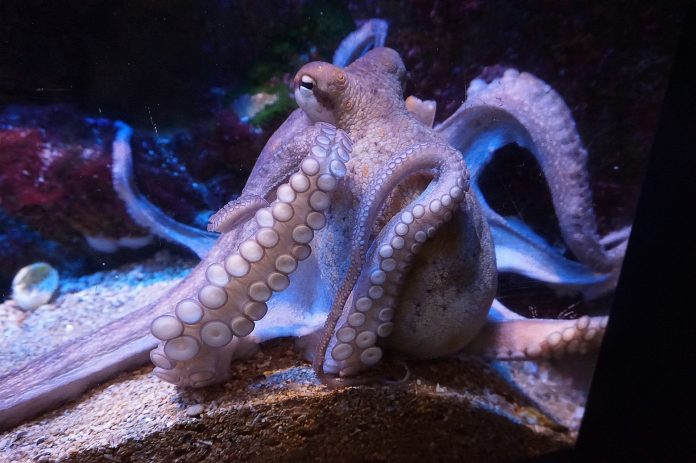Octopuses have a pretty well-earned reputation for their cunning and wit. Some have even reached celebrity status for their antics. Otto the octopus is one such headline-grabber who got caught squirting water at an annoying spot light near his tank to shut the light off. Meanwhile, Inky the octopus pulled off the greatest escape of all time by squeezing through 6-inch thick pipes to leave his home in a New Zealand aquarium for freedom in the Pacific Ocean.
Along with their relatives, squids and cuttlefish, these coleoid cephalopods have exhibited high levels of intelligence and personality not found among other marine invertebrates.
These creatures are constantly surprising scientists with their abilities. Now one team just discovered something unique in the way their bodies create proteins at the cellular level. Published in the magaizine Cell, the discovery could speak to why these animals are so smart.
It turns out, these squishy cephalopods use their RNA to edit proteins in ways that aren’t written into their DNA. It’s a trait few other species in the world make use of.
Let’s break down what that means. We mostly think of DNA as the sole keeper of our genetic identity. Those double-helix strands of A,T,C, and G sequences house all kinds of instructions on things like how to build essential proteins for our bodies. Meanwhile, RNA merely plays the role of messenger by replicating those instructions and carrying them to the protein-making parts of the cell.
Rarely will we see RNA making their own edits to the DNA’s original instructions. For instance, mammals only have about 30 recoding RNA editing sites. But researchers discovered that coleoid cephalopods have tens of thousands of conserved recoding sites.
“Basically, this is a mechanism to make proteins that are not encoded in the DNA. They are not present in the genomic sequence,” study co-author, Eli Eisenberg at Tel Aviv University, said according to phys.org. “With these cephalopods, this is not the exception. This is the rule. The rule is that most of the proteins are being edited.”
But the trait comes with a trade off. RNA editing has the potential to slow down the rate of DNA-based evolution where random mutations to the genetic code can lead to helpful adaptations in species. This is a heavy price to pay and suggests the ability to recode RNA is that much more important in the evolutionary history for this group.
Researchers observed this unique trait in two species of octopus, the common cuttlefish, and one species of squid. Meanwhile, the chambered nautilus showed much lower levels of RNA editing. It’s an interesting division because the nautilus belongs to a much older lineage of the cephalopod group that diverged with coleoids over 470 million years ago.

Most of the editing is happening on proteins in the nervous system. And it’s got the scientists wondering if this editing trait could be the reason behind the animals’ unusual levels of smarts. We already know from a previous study conducted by one of the co-authors that these creatures make use of RNA editing to help them adapt to cold water environments.
The new findings will no doubt open up new possibilities and avenues of exploration as researchers take a closer look into these creatures’ ever-fascinating brains.











